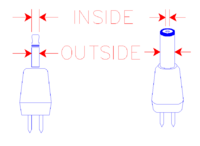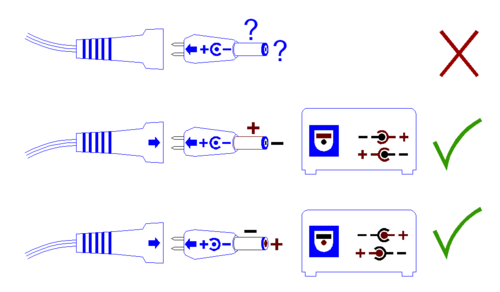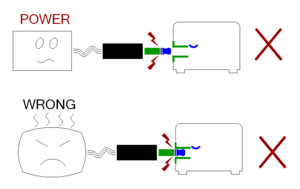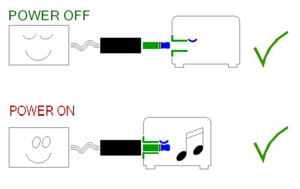(not all such connectors are coax) |
|||
| (48 intermediate revisions by 18 users not shown) | |||
| Line 1: | Line 1: | ||
{{Offline content bundle}} | |||
{{Copyedit}} | {{Copyedit}} | ||
Some really nice and useful information on this web site. Also I conceive the style and design holds superb features. | |||
== | == AC voltage safety == | ||
AC electricity with a voltage less than 50 V (RMS) is called '''Extra Low Voltage'''. This voltage is unlikely (but NOT guaranteed) to give a human being a dangerous electric shock. | |||
==What is low voltage?== | |||
*[[Electricity basics]]<!-- Add content? --> | |||
*[[Electricity safety basics]]<!-- Add content? --> | |||
Other names for low voltage: | |||
*Shock free power or voltage | |||
==What is DC voltage?== | |||
DC voltage is voltage that has a Plus and Minus terminal. | |||
DC voltage symbol: [[Image:plus min power.PNG|50px]] | |||
Other names for DC voltage: | |||
*DC power or voltage | |||
*Battery type of power or voltage (the chemistry arrangements in batteries are necessarily DC) | |||
*Plus-minus power or voltage | |||
== | ==Electric DC polarity: plus and minus == <!-- Clarify the meaning of this heading. --> | ||
[[Image:markt plus wire.PNG|thumb|Electricity basics: Marked plus wire|150px]] | |||
For most kinds of devices it is important to have the right voltage and polarity. | |||
Wrong voltage or polarity can destroy a device | |||
How to mark the plus or to find the plus pole: | |||
*Red is always plus. (This is a long established convention, but is not always observed. Check with a voltmeter.) | |||
* | |||
* | *Painted line on the plus wire, no painted line on the min. | ||
* | *Square wire is plus, round wire is minus. | ||
* | *Sharp edge is plus, round wire is minus. <!-- Did you mean smooth edge? --> | ||
* | *Knot is plus, no knot is minus. | ||
* | *Mark on the plus wire, the plus wire is special. | ||
*and so on, the plus wire is special or not normal than a normal wire. | *and so on, the plus wire is special or not normal than a normal wire. <!-- Repeat intentional? --> | ||
Connectors must be in good working order, and properly set up, to save your electric devices and reduce the chance of fire or other bad outcome: | |||
*The voltage. Connectors and wires have limits which should never be exceeded. | |||
*The | *The amperage. Connectors and wires have limits which should be exceeded. | ||
*The | *The plus and minus position. The term commonly used is polarity, for DC circuits; AC circuits have no polarity. | ||
*The | *The type of power, AC or DC. Getting this wrong is likely to damage electric circuits. | ||
*The type of | *The type of low voltage connector. Mismatched connectors almost never give satisfactory results, and often are physically incompatible. | ||
* | *Protect your plug and connector against mechanical pulling force. This is commonly called strain relief, which if done properly reduced wiring damage due to vibration or twisting or .... Unexpected separation of the connectors is generally done with a locking arrangement of some kind. | ||
* | *Take the time to check each of these issues. Failure to do so may cause fire or electrocution. | ||
[[Image:side middle connection.PNG|thumb|Side and middle electric connection|300px]] | |||
{| border=1 cellspacing=0 cellpadding=5 | {| border=1 cellspacing=0 cellpadding=5 | ||
! sign on power output | ! sign on power output !! or this sign!! sign on power consumption!! or this sign!! harmful for output ?!! harmful for power consumer ? | ||
! or this sign | |- | ||
|[[Image:inside MIN outside PLUS.PNG|100px]]||[[Image:outside PLUS inside MIN.PNG|100px]]||[[Image:inside MIN outside PLUS.PNG|100px]]||[[Image:outside PLUS inside MIN.PNG|100px]]|| no|| no | |||
|- | |||
|[[Image:outside MIN inside PLUS.PNG|100px]]||[[Image:inside PLUS outside MIN.PNG|100px]]||[[Image:outside MIN inside PLUS.PNG|100px]]||[[Image:inside PLUS outside MIN.PNG|100px]]|| no|| no | |||
| | |- | ||
|[[Image:inside MIN outside PLUS.PNG|100px]]||[[Image:outside PLUS inside MIN.PNG|100px]]||[[Image:outside MIN inside PLUS.PNG|100px]]||[[Image:inside PLUS outside MIN.PNG|100px]]|| no|| YES ! | |||
|- | |||
|[[Image:outside MIN inside PLUS.PNG|100px]]||[[Image:inside PLUS outside MIN.PNG|100px]]||[[Image:inside MIN outside PLUS.PNG|100px]]||[[Image:outside PLUS inside MIN.PNG|100px]]|| no|| YES ! | |||
! | |||
| | |- | ||
|[[Image:plus min power.PNG|50px]]|| DC||[[Image:NO plus min power.PNG|50px]]|| AC || no|| YES ! | |||
|- | |||
|[[Image:NO plus min power.PNG|50px]]||AC||[[Image:plus min power.PNG|50px]]|| DC || no|| YES ! | |||
! | |||
| | |- | ||
|} | |} | ||
== | ==Electric current ampere == | ||
{| border=1 cellspacing=0 cellpadding=5 | {| border=1 cellspacing=0 cellpadding=5 | ||
! amp. on | |||
! amp. on power output | power output | ||
! or this amp. | ! or this amp. | ||
! amp. on | |||
! amp. on power consumer | power consumer | ||
! or this amp. | ! or this amp. | ||
! harmful | |||
! harmful for output ? | for output ? | ||
! harmful for power consumer ? | ! harmful for | ||
power consumer ? | |||
|- | |- | ||
| | | 500 mA || =0.5 A|| 500 mA || =0.5 A|| no|| no | ||
|- | |- | ||
| | | 400 mA || =0.4 A|| 500 mA || =0.5 A|| YES!*|| no | ||
|- | |- | ||
| | | 500 mA || =0.5 A|| 400 mA || =0.4 A|| no|| no | ||
|} | |} | ||
== | <nowiki>*</nowiki> - Depending on how your output device is made, this condition may cause the output device (usually some kind of wall plug adapter) to burn out. The better made ones will have some sort of over-current protection built in, either in the form of a thermal fuse (self resetting), or a current limiter. | ||
==Electric voltage== | |||
{| border=1 cellspacing=0 cellpadding=5 | {| border=1 cellspacing=0 cellpadding=5 | ||
| Line 200: | Line 140: | ||
! volt consumer | ! volt consumer | ||
! harmful for output ? | ! harmful for | ||
! harmful for power consumer ? | output ? | ||
! harmful for | |||
power consumer ? | |||
|- | |- | ||
|| | || 12 V|| 12 V|| no|| no | ||
|- | |- | ||
|| | || 9 V|| 12 V|| no|| does not work well | ||
|- | |- | ||
|| | || 3 V|| 12 V|| no|| does not work | ||
|- | |- | ||
|| | || 12 V|| 9 V|| no|| YES ! | ||
|- | |- | ||
| Line 223: | Line 165: | ||
|} | |} | ||
== | == Adapter with different connectors == | ||
Protect | Protect your power supply. | ||
On the left power supply output | On the left is the power supply output and on the right power receiving device. | ||
| Line 233: | Line 175: | ||
. | . | ||
[[Image:inside outside size.PNG| | [[Image:inside outside size.PNG|200px]] | ||
Plus and | Plus and minus | ||
[[Image:Power_supply_with_connecting_adapters.PNG|500px]] | [[Image:Power_supply_with_connecting_adapters.PNG|500px]] | ||
| Line 241: | Line 183: | ||
''' Adapter connectors ''' | ''' Adapter connectors ''' | ||
{| border=1 cellspacing=0 cellpadding=5 | {| border=1 cellspacing=0 cellpadding=5 | ||
! OUTSIDE | |||
(mm) | |||
! INSIDE | ! INSIDE | ||
mm | (mm) | ||
! | ! Shortcut | ||
! Plug Type | |||
(code) | |||
! mark | ! mark | ||
|- | |- | ||
|| 2 | |||
|| 6.5|| 1.0|| no|| AA || = | |||
|- | |||
|| 6.5|| 1.75|| no|| AB || = | |||
|- | |||
|| 2.5|| 2.5|| YES!|| A (*) || = | |||
|- | |- | ||
|| 3 | || 3.5|| 3.5|| YES!|| B (*) || = | ||
|- | |||
|| 3.0|| 1.0|| no|| C|| = | |||
|- | |- | ||
|| 0 | || 5.0|| 2.1|| no|| D|| = | ||
|- | |- | ||
|| | || 5.5|| 2.1|| no|| E|| = | ||
|- | |- | ||
|| | || 5.0|| 2.5|| no|| F|| = | ||
|- | |- | ||
|| | || 5.5|| 2.5|| no|| G|| = | ||
|- | |- | ||
|| | || 3.5|| 1.35|| no|| H|| = | ||
|- | |- | ||
|| | || 4.0|| 1.7|| no|| I|| = | ||
|- | |- | ||
| | || 4.75|| 1.75|| no|| J|| = | ||
| | |- | ||
|| 5.0|| 1.5|| no|| M|| = | |||
|- | |||
|| 5.5|| 1.5|| no|| N|| = | |||
|- | |||
|| 5.5|| 5.8|| no|| P|| = | |||
|- | |||
|| 6.3|| 3.0|| no|| Q|| = | |||
|- | |||
|| 7.0|| 1.0|| no|| R|| = | |||
|- | |||
| 2.35 || 0.75|| no|| S|| = | |||
|} | |||
(*) Mono jack | |||
=== Type A USB === | |||
Add a picture with positive and negative labelled (in red (5+) and black) on a female Type A USB connector. | |||
[[image:femaleUSB.png]] | |||
<gallery> | |||
Image:femaleUSB.png|Female, Type A,USB connector with pin diagram. | |||
</gallery> | |||
==What is electrical | ==What is an electrical short?== | ||
An electrical short is when the plus and minus are in contact with each other. | |||
This is harmful for the adapter or battery. | This is harmful for the adapter or battery. | ||
== | ==Electrical short with (dis)connecting device==<!-- Writing (dis)connect indicates either connect or disconnect. Is that what you intended? If you mean just disconnect, delete the (). --> | ||
Some smaller connectors shortcut the power supply if you (dis)connect . | Some smaller connectors shortcut the power supply if you (dis)connect . | ||
| Line 323: | Line 303: | ||
==Car cigarette lighter plug== | ==Car cigarette lighter plug== | ||
A | A car cigarette lighter plug must have the plus in the middle and the minus on the outside. | ||
Some female | Some female car sockets have 24 volts. | ||
[[Image:Car_cigarette_lighter_DC _Plus and Min.PNG|75px]] | [[Image:Car_cigarette_lighter_DC _Plus and Min.PNG|75px]] | ||
==See | == See also == | ||
*[[Electricity basics]] | *[[Electricity basics]] | ||
*[[Power and energy basics]] | *[[Power and energy basics]] | ||
*[[Electrical wiring and switching]] | *[[Electrical wiring and switching]] | ||
== Interwiki links == | |||
* [[Wikipedia:DC Power Connectors]] | |||
[[Category:How tos]] | [[Category:How tos]] | ||
| Line 340: | Line 324: | ||
external links | external links | ||
Revision as of 06:26, 3 September 2018
Template:Offline content bundle
Some really nice and useful information on this web site. Also I conceive the style and design holds superb features.
AC voltage safety
AC electricity with a voltage less than 50 V (RMS) is called Extra Low Voltage. This voltage is unlikely (but NOT guaranteed) to give a human being a dangerous electric shock.
What is low voltage?
Other names for low voltage:
- Shock free power or voltage
What is DC voltage?
DC voltage is voltage that has a Plus and Minus terminal.
Other names for DC voltage:
- DC power or voltage
- Battery type of power or voltage (the chemistry arrangements in batteries are necessarily DC)
- Plus-minus power or voltage
Electric DC polarity: plus and minus

For most kinds of devices it is important to have the right voltage and polarity. Wrong voltage or polarity can destroy a device
How to mark the plus or to find the plus pole:
- Red is always plus. (This is a long established convention, but is not always observed. Check with a voltmeter.)
- Painted line on the plus wire, no painted line on the min.
- Square wire is plus, round wire is minus.
- Sharp edge is plus, round wire is minus.
- Knot is plus, no knot is minus.
- Mark on the plus wire, the plus wire is special.
- and so on, the plus wire is special or not normal than a normal wire.
Connectors must be in good working order, and properly set up, to save your electric devices and reduce the chance of fire or other bad outcome:
- The voltage. Connectors and wires have limits which should never be exceeded.
- The amperage. Connectors and wires have limits which should be exceeded.
- The plus and minus position. The term commonly used is polarity, for DC circuits; AC circuits have no polarity.
- The type of power, AC or DC. Getting this wrong is likely to damage electric circuits.
- The type of low voltage connector. Mismatched connectors almost never give satisfactory results, and often are physically incompatible.
- Protect your plug and connector against mechanical pulling force. This is commonly called strain relief, which if done properly reduced wiring damage due to vibration or twisting or .... Unexpected separation of the connectors is generally done with a locking arrangement of some kind.
- Take the time to check each of these issues. Failure to do so may cause fire or electrocution.
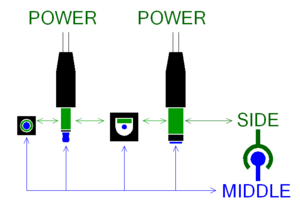
| sign on power output | or this sign | sign on power consumption | or this sign | harmful for output ? | harmful for power consumer ? |
|---|---|---|---|---|---|
| no | no | ||||
| no | no | ||||
| no | YES ! | ||||
| no | YES ! | ||||
| DC | AC | no | YES ! | ||
| AC | DC | no | YES ! |
Electric current ampere
| amp. on
power output |
or this amp. | amp. on
power consumer |
or this amp. | harmful
for output ? |
harmful for
power consumer ? |
|---|---|---|---|---|---|
| 500 mA | =0.5 A | 500 mA | =0.5 A | no | no |
| 400 mA | =0.4 A | 500 mA | =0.5 A | YES!* | no |
| 500 mA | =0.5 A | 400 mA | =0.4 A | no | no |
* - Depending on how your output device is made, this condition may cause the output device (usually some kind of wall plug adapter) to burn out. The better made ones will have some sort of over-current protection built in, either in the form of a thermal fuse (self resetting), or a current limiter.
Electric voltage
| volt output | volt consumer | harmful for
output ? |
harmful for
power consumer ? |
|---|---|---|---|
| 12 V | 12 V | no | no |
| 9 V | 12 V | no | does not work well |
| 3 V | 12 V | no | does not work |
| 12 V | 9 V | no | YES ! |
Adapter with different connectors
Protect your power supply.
On the left is the power supply output and on the right power receiving device.
.
Plus and minus
Adapter connectors
| OUTSIDE
(mm) |
INSIDE
(mm) |
Shortcut | Plug Type
(code) |
mark |
|---|---|---|---|---|
| 6.5 | 1.0 | no | AA | = |
| 6.5 | 1.75 | no | AB | = |
| 2.5 | 2.5 | YES! | A (*) | = |
| 3.5 | 3.5 | YES! | B (*) | = |
| 3.0 | 1.0 | no | C | = |
| 5.0 | 2.1 | no | D | = |
| 5.5 | 2.1 | no | E | = |
| 5.0 | 2.5 | no | F | = |
| 5.5 | 2.5 | no | G | = |
| 3.5 | 1.35 | no | H | = |
| 4.0 | 1.7 | no | I | = |
| 4.75 | 1.75 | no | J | = |
| 5.0 | 1.5 | no | M | = |
| 5.5 | 1.5 | no | N | = |
| 5.5 | 5.8 | no | P | = |
| 6.3 | 3.0 | no | Q | = |
| 7.0 | 1.0 | no | R | = |
| 2.35 | 0.75 | no | S | = |
(*) Mono jack
Type A USB
Add a picture with positive and negative labelled (in red (5+) and black) on a female Type A USB connector.
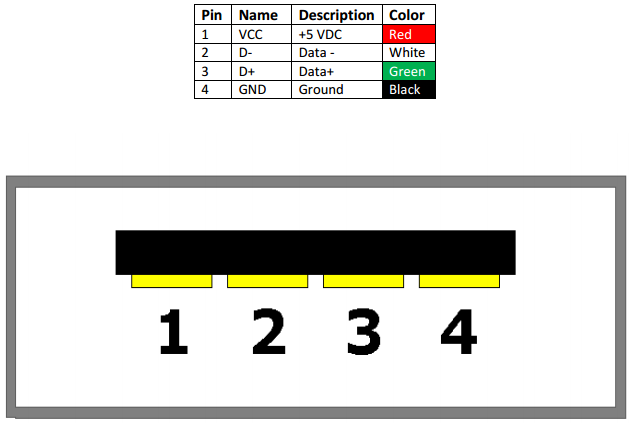
-
Female, Type A,USB connector with pin diagram.
What is an electrical short?
An electrical short is when the plus and minus are in contact with each other.
This is harmful for the adapter or battery.
Electrical short with (dis)connecting device
Some smaller connectors shortcut the power supply if you (dis)connect .
(dis)Connect the connector to the device if there is NO power on the plug.
Right
Car cigarette lighter plug
A car cigarette lighter plug must have the plus in the middle and the minus on the outside.
Some female car sockets have 24 volts.
See also
Interwiki links
external links
